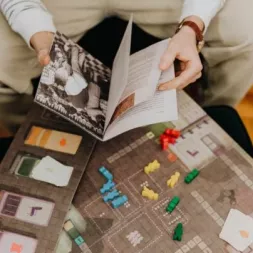
Game Design for Teaching and Learning
Participants will learn the difference between Game-Based Learning, Gamification, and Game Design. In addition, they will get familiar with Inquiry-Based Learning (IBL), learn to run short game jams, and be introduced to the different steps of game design (Planning, Production, Testing, and Revising).
Description
Student motivation is becoming increasingly challenging in contemporary education. Technology has created an instant gratification culture, where students are accustomed to receiving immediate feedback and rewards. Moreover, students often do not perceive how proposed classroom activities are relevant to their lives and goals, or can connect with their interests. How to approach such an issue, which we may call the challenge of motivation? Game-Based Learning (GBL) and Game Design are powerful tools for engaging students. After all, who doesn’t like playing? By situating learning in playing activities, Game-Based Learning promotes active learning, helps learners acquire important soft skills, and personalizes the learning experience. Would you like to learn more about how to introduce these methodologies in your classroom? The course will teach participants to apply the principles of Game-Based Learning and Game Design in their school setting to improve student motivation and engagement in any curricular subject. Participants will understand the difference between Game-Based Learning, Gamification, and Game Design, and when it is more appropriate to use each methodology. Accordingly, they will learn to use games in the classroom to promote students’ skills and knowledge and on a particular domain or curricular subject. Moreover, participants will discover how to gamify learning with simpler (e.g., quizzes) and more complicated (e.g., escape rooms) quests. In particular, participants will get familiar with Inquiry-Based Learning (IBL), a teaching method where students are encouraged to find their own answers t...read more.
Learning objectives
The course will help the participants to:
- Understand the difference between Game-Based Learning, Game Design, and Gamification;
- Focus on the aspects of Game-Based Learning closer to their preferences;
- Use board games with students to develop their soft skills;
- Run short Game Jams (i.e., game design sessions);
- Use Inquiry-Based Learning to structure escape rooms/treasure hunts;
- Promote the acquisition of curricular content through game-based activities;
- Debrief gaming sessions in the classroom.
--> Download all course info in PDF <--
Methodology & assessment
Certification details
Here's how we ensure your achievements are recognized and validated:
- Certificate of Attendance: Upon successful completion of your course, you will receive a Certificate of Attendance in line with Erasmus quality standards.
- Europass Mobility Certificate: If requested, you can also receive the Europass Mobility Certificate.
- Seamless Administration: We provide assistance and guidance to our participants throughout every step of the project: from the grant application to the final documents.
To make your participation accessible, our courses are designed to allow you to request 8 days of individual support for your subsistence costs. This includes 6 days for the course and an additional 2 days for travel.
Useful resources:
- Live Chat support: Monday-Friday | 8:30-22:30 CET
- FAQ
- Guides to Erasmus+
- OID Numbers and Fiscal Data
A 60 € late registration fee will be applied if you register less than 8 weeks before the course start date.
Pricing, packages and other information
-
Price:480Euro
Additional information
-
Language:English
-
Target audience ISCED:Primary education (ISCED 1)Lower secondary education (ISCED 2)Upper secondary education (ISCED 3)
-
Target audience type:TeacherHead Teacher / PrincipalTeacher Educator
-
Learning time:25 hours or more
Past sessions
More courses by this organiser

Happy Schools: Positive Education for Well-Being and Life-Skills Development

Social and Emotional Learning (SEL) for Successful Schools


